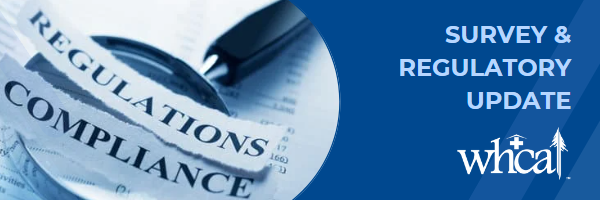Medication Assistance Via Accurately Directing Others
Residents must be assessed for the level of staff assistance they need with medications. Some residents (and in many instances some medications) warrant different levels of management. For example, a given resident may be assessed as completely independent in managing an as-neededinhaler, and require staff assistance with oral medications and even might require staff administration with insulin injections. For this reason, resident assessments should not only include the resident’s abilities but also take into consideration the complexity and routes of medications ordered to determine the resident’s abilities to self-administer, either independently or with assistance, or whether administration is needed.
Medication assistance is likely the way most residents in assisted living receive their medications. Medication assistance is defined in WAC as, “assistance with self-administration of medication rendered by a nonpractitioner to a resident of an assisted living facility in accordance with chapter 246-888 WAC.”1 To take those definitions further, a nonpractitioner is defined as “any individual who is not a practitioner as defined in WAC 388-78A-2020 and chapter 69.41 RCW.”
To summarize, a nonpractitioner excludes the following: physician or osteopathic physician, surgeon, dentist, podiatric physician and surgeon, acupuncturist, Eastern medicine practitioner, veterinarian, registered nurse, advanced practice registered nurse, licensed practical nurse, optometrist, physician assistant, naturopath, licensed athletic trainer, pharmacist, or a dental hygienist working under the supervision of a dentist.
Because the act of assisting with medications was added by legislative vote to the definition of activities to daily living, this level of service must be provided by a trained caregiver, LPN, or RN. Washington state has no specific curriculum or course requirements to ensure caregivers are adequately prepared to assist with medications; this expectation falls to the individual assisted living.
There are several ways a resident may receive medications via self-administration with assistance. Per the emergency WAC 246-945-710 through -728, which replaced WAC 246-888 word-for-word in 2021, residents in home- and community-based care settings including assisted livings may receive medication assistance from a nonpractitioner in one or more of the following ways:
1. Reminding or coaching a resident to take their medications;
2. Handing the medication container to the resident;
3. Opening the medication container for the resident;
4. Transferring the medication(s) from their original containers to an enabler (such as a medication or souffle cup) for ease of the resident taking them;
5. Placing the medications into the resident’s hand.
Assisted living facilities enjoy an additional feature of self-administration with assistance that is not offered in other home- and community-based care settings such as adult family homes or supported living environments. This additional feature is as follows, and does NOT require nurse delegation but rather is still considered part of medication assistance and therefore can be offered and provided by a caregiver: “In licensed assisted living facilities, self-administration may include situations in which an individual cannot physically self-administer the medications but can accurately direct others.”
Of note, self-administration via accurately directing others can include oral, topical, inhaled medications, eye drops, ear drops, nasal medications, as well as rectal and vaginal medications. It does not include any injectable medications.
The assisted living facility assessor should explain the use of “self-administration via accurately directing others” in the resident’s assessment and negotiated service agreement; this provides clarity for staff and minimizes the likelihood of service creep, whe0re the resident’s ability to accurately direct the self-administration of medications result in situations where the caregiver might move to full administration without the benefit of nurse delegation.
By way of clarity, whether the resident receives medication assistance via self-administration with assistance or self-administration via accurately directing others, the following caveats apply:
• The resident does not need to know the name of the medication, intended effects, side effects, or other details;
• The resident must be aware s/he is receiving medications;
• Residents reserve the right to choose not to take a medication;
• Self-administration with assistance shall occur immediately prior to the ingestion or application of a medication (so, no “pre-pouring”); and
• Oxygen is not considered a medication, and therefore assistance in adjusting the liter flow is not included in the realm of medication assistance.
For additional information about assisted living regulations and/or medication management in assisted living, please contact Vicki McNealley or call her at 1-800-562-6170 extension 107.
Posted in Assisted Living, Survey & Regulatory

